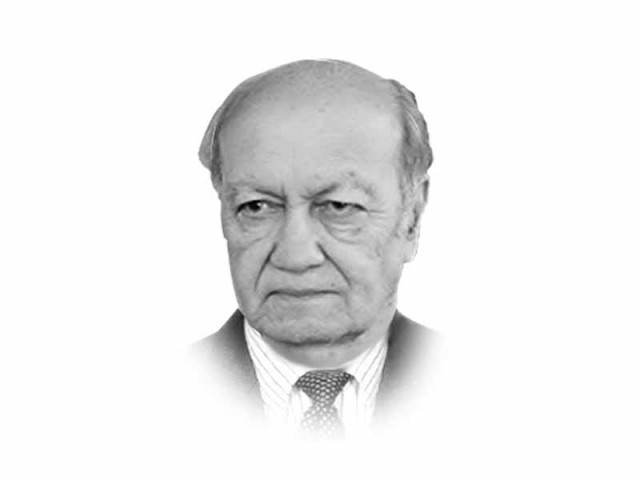Pakistan’s foreign and economic policy dilemmas
Once again the nation stands at a crossroads wherein its economy is tottering

The writer is a retired lieutenant general of the Pakistan Army and a former federal secretary. He has also served as chairman of the Pakistan Ordnance Factories Board
It will therefore continue to press Pakistan and support the Afghan government until there is some face saving for it.
The normal mantra of the United States for years has been that there are intricate linkages between a resurgent Taliban in Afghanistan and Pakistan’s security establishment. They continue to harp that it is in Pakistan the Taliban leadership coordinates its activity in Afghanistan. What they conveniently forget in fact is that Pakistan’s geography has been exploited by the US and Nato forces to their advantage and at our cost. Sadly, it is not the state but the militant organisations like the TTP, the Afghan Taliban and several other militant groups that have also benefited from Pakistan’s location causing enormous damage to its integrity, economy and above all its reputation.
We cannot absolve our military and civilian leaders for taking the critical decisions for joining the Afghan jihad or siding with the United States on the war against terror wholeheartedly, without remorse and setting aside national interests. The argument that Pakistan had no other choice is only partially credible. For it the absence of legitimacy of military rulers or lack of foresight of political leaders coupled with pressing economic problems has been the rationale for taking some of these momentous decisions.
Once again the nation stands at a crossroads wherein its economy is tottering and the government is desperately in need of substantial injection of funds. Saudi Arabia a solid strategic ally and China an all-weather friend and a close strategic partner are coming to our rescue. This is at a time when Washington has suspended all economic assistance and has exerting maximum political pressure.
Fortunately, the timely assistance of six billion dollars that is forthcoming from Saudi Arabia and expected similar concessional loans from China and the UAE will provide relief to shore up the balance-of-payments position in the short term. And as has been mentioned, it will place Pakistan in a better position to negotiate with the IMF and a smaller package would be sought from them. Nonetheless, Pakistan has to undertake serious measures to correct the course of its economy.
There may be no specific demands from Saudi Arabia and China but there would be, and should be, definite expectations. It would be naivety on the part of the government if we fail to comprehend these. Saudi Arabia expects us to stand by it at this critical hour. And understandably we are faithfully doing just that. The PM’s visit to Saudi Arabia and his efforts at building a close rapport with the Prince are its manifestations.
To achieve long-term economic autonomy and political stability, Pakistan apart from taking major fiscal and monetary reforms will have to make fundamental changes in foreign, security and domestic policies. What is really implied is that as long as we are embroiled in Afghanistan, maintain inimical relations with India and are unable to gain the confidence of the United States over policy towards the Afghan Taliban and our own militant groups, the economic situation would remain weak and political stability would be hard to achieve.
Improvement in relations with neighbours becomes an economic and political necessity for Pakistan if it is serious in benefiting from its geographic location. Pakistan can serve as an ideal corridor for trade, energy and tourism and a great facilitator for the whole region. But for the last 70 years this has not happened.
PM Imran Khan’s offer to engage with India to fight poverty, the common enemy of the two countries, and find an amicable resolution of the Kashmir issue was regrettably shunned. A similar initiative was taken by former PM Nawaz Sharif, which became a victim of internal politics and failed to make progress. It is possible that the attitude of PM Modi may change after the national elections in 2019. At the same time there are fears that India would continue to pursue a hostile policy to counter Pakistan’s strong strategic ties with China and its opposition towards CPEC. And in this, it seems there is convergence and support of the United States.
In the past Pakistan’s relations with Afghanistan have remained closely linked to its relations to India. Pakistan is deeply concerned with India’s growing capabilities and intentions. Rooted in Pakistan’s anxieties is that India’s heavy presence in Afghanistan besides other political, economic and strategic reasons are also designed to encircle it. This frame is important to understand in order to comprehend complexity of the region. As it stresses the crisscrossing nature of regional politics and indicates that a stable Afghanistan is dependent on a secure Pakistan. The question then emerges is that is it possible to gain the trust of Afghan leadership and develop a neighbourly relationship despite strained relations with India and without gaining the confidence of the US? In all probability this would not be possible at least in the near future. It is unfortunate but a hard reality that the trust level between Afghanistan and Pakistan is still low.
Despite these shortcomings it would seem more sensible for Pakistan to continue with the policy to win the confidence of Afghanistan and renew efforts at engaging with India after its national elections.
Published in The Express Tribune, October 31st, 2018.
Like Opinion & Editorial on Facebook, follow @ETOpEd on Twitter to receive all updates on all our daily pieces.













COMMENTS
Comments are moderated and generally will be posted if they are on-topic and not abusive.
For more information, please see our Comments FAQ